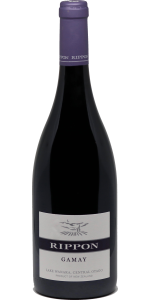
Description
Produced from 30 year old Gamay vines, ungrafted and unirrigated.
Lovingly grown, wild fermented, barrel matured. No nutrients, no filtering or fining of any kind, no added sulphur in the winery, a full skin, carbonic maceration Gamay Noir. It’s completely alive and quite beautiful. As much as we note that schist’s compression and foliated structure can issue wines of precision and detail, here schist’s refractive, luminous nature shines a direct, unadulterated light onto Gamay’s own primary fruit and spice.
Awards
93 pts James Suckling
Certifications
Alcohol
13.0%
Analytical data
dry
Vineyard
Rippon aims to foster products that are a true and accurate reflection of their site; climate, aspect, culture and soils.
With their ability to metabolise minerals from the soil and release soluble exudates available to plants, it is the microflora of the soil which allows the vine to be receptive and reflective of the site. Our true craft therefore is to work the land in such a way as to maintain a healthy, natural and living soil.
When making operational decisions on the land, we seek to consider what effect our actions with have on soil biota. Whilst with farming it is impossible to allow the land to carry out all its natural processes (our farming aspirations are ultimately in conflict with the land’s natural state), many compromises are be made.
At Rippon, we work to achieve our goals as winegrowers in constant consideration of what the land itself might seek to gain from us in return. We believe this relationship allows Rippon (the place) to carry out enough of its own natural processes so as to continue expressing itself as an individual – and through the products it issues.
The indices considered when making operational, soil management related decisions may include:
Physical: altitude, ultra-violet light, wind, water (rainfall, soil-retention, irrigation) Mechanical: cultivation, compaction, Cultural: finance, staff availability, health & motivation Astral: lunar, planetary, seasonal & daily rhythms
The frequency, timing and tasks of all staff are carefully considered with regards to the above decision-making indices.
No synthetic fertilizers, herbicides, fungicides, pesticides or other chemicals that may contribute to soil degradation are used.
Vinification
The winery's indigenous yeast population fermented this fruit in a closed environment saturated in carbon dixoide harvested from fermenting Gewurtraminer fruit. Reaching a maximum temperature of 26 degrees over the 19 days of fermentation it remained on its skin for 14 days and was then run into neutral oak. It went naturally through its malolactic fermentation in spring and was then run into bottle with neither filtering nor fining nor any sulphur additions


